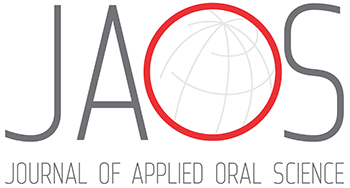ABSTRACT
The successful use of composite resins in Dentistry depends on physicochemical properties, but also on the biological compatibility of resins, because of the close association between pulp and dentin.
Objective
The aim of this study was to evaluate cytotoxicity and cytokine production induced by light-cured or non-light-cured methacrylate-based and silorane composite resins in RAW 264.7 macrophages.
Material and Methods
Cells were stimulated with the extracts from light-cured or non-light-cured composite resins. After incubation for 24 h, cytotoxicity was assessed with the lactate dehydrogenase (LDH) and methyl thiazolyl tetrazolium (MTT) assays, and total protein was quantified using the Lowry method. TNF-α detection was examined with an enzyme-linked immunosorbent assay (ELISA) conducted with cell supernatants after cell stimulation for 6, 12, and 24 h. Data were analyzed using one-way analysis of variance (ANOVA) and Tukey’s post hoc test (α=0.05).
Results
KaloreTM and FiltekTM Silorane were cytotoxic with or without light curing (p<0.05) after 24 h of incubation. KaloreTM stimulated the early production of TNF-α in comparison with control (p<0.05), whereas FiltekTM Silorane did not affect TNF-α levels after 6 and 12 h (p>0.05). However, after 24 h FiltekTM Silorane inhibited the production of TNF-α (p<0.05).
Conclusions
KaloreTM and FiltekTM Silorane were cytotoxic regardless of light curing. The extract obtained from KaloreTM after 15 days of incubation stimulated the production of TNF-α, unlike that obtained from FiltekTM Silorane.
Dental materials; Composite resins; Cytotoxicity; Cytokines


